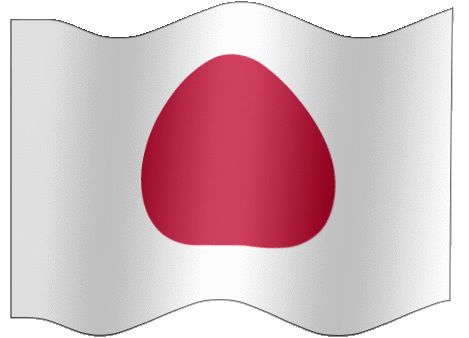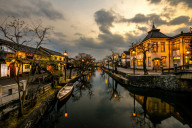 |
 |
 |
Let's be more moved - turn a trip of sights into a trip of feeling!

| OKAYAMA Ken |
Free estimates
Free travel consultation
 |
OKayama Ken ("Ken" in Japanese means prefecture) is home to ancient ruins, suggesting that people have been living there since the Paleolithic period.
Known as Kibi Country in ancient times, it flourished as one of the central
countries in Japan.
There is a legend that long ago, this area was home to a demon that attacked villagers and committed a series of crimes, so Momotaro defeated the demon. Many of the settings of legend remain today.
Known as "Okayama, the Land of Sunshine," Okayama ken has the fewest rainy days in Japan and is characterized by its warm climate and many sunny days. As a result, the area is also well-known for its fruit production as called the Fruit Kingdom, which takes advantage of the climate, including white peaches and muscats. |
  |
|
|
|
|
|
|
| #33201 |
|
|
|
|
|
| formerly HONJIN (Main Camp) at YAKAGE |
In the past, feudal lords often stayed here |
|
|

This historic accommodation was built by the Ishii family in the early 17th century. It consists of a main building and an annex, both of which are designated as important cultural properties by the government (this is the only place in Japan where both are designated as important cultural properties). It also has a sake brewery, and many feudal lords used to stay here. |
 |

Yakage town |
|
|
|
|
|
|
| #33501 |
|
|
|
|
|
| KOJIMA Jeans |
the Mecca of Japanese Jeans |
|
|
|

Kojima has long prospered as a textile town producing school uniforms, work clothes, and tabi socks, but it began to decline after the 1960s. So, taking advantage of the know-how it had built up in making work clothes, the first jeans made in Japan were born, sewn from denim fabric imported from U.S.A. Furthermore, denim fabric can now be produced domestically, and there are many attractions to see, such as the unique Jeans Street with over 40 stores lined up, and the Jeans Museum. |
 |

Kojima, Kurashiki city |
|
|
|
|
|
|
| #33202 |
|
|
|
|
|
| KORAKUEN Park |
One of the three most famous gardens in Japan |
|
|
|

Korakuen is one of the most famous feudal gardens of the Edo period, and is designated as a Special Place of Scenic Beauty by the national government as one of Japan's Three Great Gardens. It has been passed down to the present day without any major changes from the Edo period. The wide lawns, pond, artificial hills, and teahouse are connected by garden paths and waterways, making it a stroll-style garden designed to allow visitors to enjoy the changing scenery as they walk. |
 |

Okayama city |
|
|
|
|
|
|
| #33203 |
|
|
|
|
|
| BIZEN Ware |
the charm of Bizen ware lies in its dark brown surface |
|
|

The dark brown surface that is the charm of Bizen ware is produced by firing soil excavated from deep in the rice paddies with soil rich in iron, a mixture of mountain soil and black soil. The composition of the soil varies depending on the location where it is excavated, such as the ratio of the soil mixture and the length of time each soil is left to sit for several years. Therefore, skilled techniques are required to make it, and some artists use soil that has been left to sit for more than 10 years. Today, Bizen ware remains very popular. The many square brick chimneys that can be seen in this area are from Bizen ware kilns. |
 |

Bizen city |
|
|
|
|
|
|
| #33401 |
|
|
|
|
|
| HINASE Oysters |
milky and chewy oysters |
|
|

At Hinase Fishing Port, farmed oysters are landed in abundance from around November to March. At the fishery cooperative's fish market, Gomi-no-ichi, raw oysters are sold from November to March. There is also a seafood barbecue restaurant. Unique okonomiyaki named Kakioko filled with oysters, is known as B-grade gourmet food (Okonomiyaki is a Japanese-style pancake made from egg, flour and water with lots of toppings). |
 |

Hinase, Bizen city |
|
|
|
|
|
|
| #33204 |
|
|
|
|
|
| KURASHIKI City |
a city where white-walled streets remain |
|
 |

Kurashiki City is known for the Kurashiki Bikan (beautiful landscape) Historical
Quarter, where white-walled streets remain, and the Great Seto Bridge,
which connects Honshu and Shikoku island. The white-walled streets, which
combine Japanese and Western styles, are still preserved, and the city
is one of the prefecture's leading tourist destinations, while it is also
one of the leading industrial cities in western Japan. The Ohara Museum
of Art, Japan's first private Western art museum, was founded by a local
businessman and is a must-see, with many famous Western masterpieces on
display, including those by famous artists El Greco, Claude Monet, Renoir,
Gauguin, Cezanne, Utrillo, and Picasso. It opened in 1930. |
 |

Kurashiki city |
|
|
|
|
|
|
|
|
|
|
|
|
|
|
|
|
|
|
|
|
|
|
|
|
|
|
|
|
|
|
|
|
|